WASHINGTON — D.C. is suing popular social media platform TikTok for preying on children and operating an illegal virtual economy, the Office of the Attorney General announced Tuesday.
The District is joined by 13 states in suing the company.
The suit, brought by D.C. Attorney General Brian Schwalb, alleges two main arguments. First, it argues that TikTok Inc. is intentionally designed to be addictive to children and causing mental and physical harm to children in the District. Second, it argues by allowing users to buy virtual coins to send virtual gifts to creators on live streams, the company is breaking D.C.’s money transmission laws and operating an unlicensed virtual economy.
"TikTok's platform, designed to be dangerously addictive, inflicts immense damage on an entire generation of young people," Schwalb said in a press release. "In addition to prioritizing its profits over the health of children, TikTok's unregulated and illegal virtual economy allows the darkest, most depraved corners of society to prey upon vulnerable victims. The company knows what is happening and has chosen to ignore it. This lawsuit seeks to put an end to its illegal, deceptive, and predatory behavior."
The suit claims that children and adolescents are more susceptible to being exploited by the system of endless scrolling.
“To get users hooked on the app, TikTok uses a dopamine-inducing algorithm that spoon-feeds users highly tailored videos to keep them trapped on the platform for hours on end,” an OAG press release states.
In 2021, an Office of the State Superintendent of Education report found that 70% of all District high school students, including 74% of high school girls, spend more than three hours per day on screen time, and 67.5% of District middle school students spend three or more hours per day on screen time.
This is where the unlicensed virtual economy allegations come in. On TikTok, viewers can buy “coins” they can use to send “gifts” to creators on live streams. The gifts look like cartoon characters and fun graphics, but gifts can be exchanged for money by the creators they're sent to. TikTok also takes 50% commission from each purchase.
But the OAG says that those graphics entice children to spend money without realizing exactly what they’re doing.
Because people are technically sending money to other people by paying creators on the app, the OAG says TikTok should be subject to the same laws that apps such as Venmo and CashApp are subject to. The OAG wants the company to register the app as a money transmitter with the U.S. Treasury Department and D.C. Department of Insurance, Securities, and Banking (DISB).
Finally, the OAG is also saying that because TikTok isn’t subject to these laws currently, and because it takes a commission from coin purchases, it allows and profits from a marketplace of child sexual exploitation. The OAG alleges that teenagers who live stream through the app are frequently exploited for sexual content through the livestreaming and coin features, “allowing the app to essentially operate like a virtual strip club with no age restrictions.”
The OAG says it is seeking to force TikTok to change harmful and deceptive practices and also monetary restitution for impacted D.C. residents, civil penalties and attorneys' fees.

